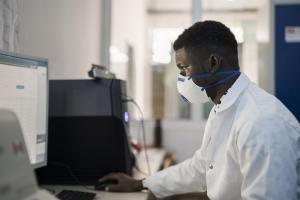Talk radio, teletherapy expands mental health services in Ethiopia
Addis Ababa – The Erq Ma’ed – or ‘reconciliation table’ – social enterprise has mixed talk radio, communications and counselling to boost the mental health and wellbeing of Ethiopians for nearly a decade. With the added pressure due to the COVID-19 pandemic, their journey of innovation to meet people’s mental health needs amid unprecedented times has been further spurred on.
The pandemic has placed a huge strain on essential health services, including mental health services. Strict measures such as movement restrictions and lockdowns put in place by many countries in the region in the initial phase of the pandemic, as well as overstretched workforce caused significant disruptions.
“We typically get around 20 000 calls each year, but the number has already far surpassed that this year,” explains Ephrem Bekele Woldeyesus, chief programme officer at Erq Ma’ed.
“Many calls have been driven by families struggling to relate to each other during the lockdown as well as issues related to domestic and sexual violence and marital crises.”
Erq Ma’ed’s 10 trained counsellors receive calls off the back of a weekly radio show that has reached 10 million people with messages on wellness, child and youth development, reconciliation, family therapy and mental health since 2013. Listeners phone in and share their stories live on air.
“One patient was so afraid that she had COVID. So we started by helping her to stabilize her emotions and actions. It’s a bit like psychological first aid. After that she opened up about other worries, like how to feed her family and keep her business going,” says Woldeyesus.
“To keep our services running during the pandemic, we’ve retrained our 10 counsellors in teletherapy, delivering sessions through Zoom and registering people through the telegram messaging app. Our counsellors deliver psychological therapy six days per week for up to 12 hours per day.”
To determine the progress of patients seeking mental health therapy, Erq Ma’ed carries out pre- and post-therapy assessments, and before the end of a therapy course they are invited for an in-person, final session whenever possible.
Like many African nations, Ethiopia’s mental health services were overstretched and underfunded even before the pandemic hit. The country has just 83 psychiatrists for a population of over 110 million. Mental health services are concentrated around the capital Addis Ababa, while 80% of the population lives in rural areas.
“Everyone knows to wash their hands, wear a mask and keep a safe distance, but what about mental health, and teaching safe, healthy coping skills in times of severe stress?” says Woldeyesus.
“Our radio show is very popular, and we use advertising revenue to fund our counselling programme, providing support for free to over 2000 people every year, but we can’t afford to help everyone. We are a social enterprise and we focus on accessibility and affordability.”
Despite the challenges, the team plans to expand their counselling services to schools around Addis Ababa, offering mental and social health programmes to students.
The team was one of 30 African winners in the World Health Organization Regional Office for Africa’s Global Health Innovation Challenge in 2018. There were over 2400 entrants from 77 countries.



